 |
Gender
Forum offers you an opportunity to share your views
and concerns with us. Email to
[email protected]
or mail to Gender Forum, C/O Features Editor, Daily News-
Editorial, Lake House, Colombo. |
Role of women in international politics
Nipuni WIMALAPALA

|
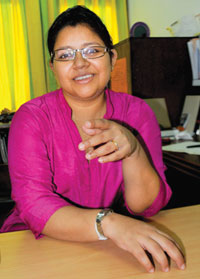
Dr Maneesha Pasqual. Picture by Nissanka Wijerathna |
Female representation in politics and international affairs is
gradually increasing even though the expected ratio has not been
achieved yet. Dr Maneesha Pasqual of International Relations Department,
University of Colombo expressed her ideas about the position of women
worldwide in politics at the moment.
According to Dr Pasqual, even though there are a number of strong
female leaders in the world, still women’s representation in
international politics is not strong enough. Women have not achieved the
expected percentage of representation in politics since it is largely
male dominant. Women are marginalised as a whole in this issue while
only a very few women have achieved success in the sphere of politics.
As she mentioned, there are 193 members of the United Nations. There
are 30 female leaders in 29 different countries or self-ruling
territories at the moment. Of the monarchies, there are reigning queens
in three countries: Denmark, the Netherlands, and the United Kingdom.
The 12 female presidents are in Argentina, Brazil, Costa Rica, Finland,
India, Ireland, Kosovo, Kyrgyzstan, Liberia, Lithuania, San Marino and
Switzerland.
Currently there are 12 woman prime ministers in Australia,
Bangladesh, Croatia, Germany, Iceland, Mali, Slovakia, Thailand and
Trinidad and Tobago and in the self-governing territories of Bermuda,
Sint Maartin and the Aland Islands.
“Whenever there is a female leader in a country, always there is a
transformative ruling system. They change things very often. It is often
said that women are good at peace and the fact is denied by some woman
rulers like Margaret Thatcher who was involved in international
politics. There should be a good education background, experience and
the capability to become a good female leader. Training from the
grassroot level, experience of interacting with people, training from
the fundamental politics would help women become capable leaders. Women
have been involved in politics in early history. There were queens in
some countries like Ethiopia, Egypt long ago,” said Pasqual.
|
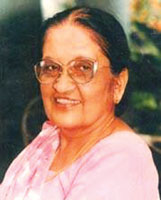
World’s First Woman Prime Minister
Sirimavo Bandaranaike |
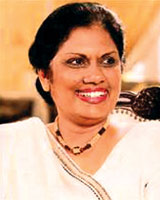
Former President Chandrika
Bandaranaike Kumaratunga |
As Dr Pasqual states Women in Asian countries fully engage themselves
in politics compared to some other parts of the world. In Asian
countries like Sri Lanka, India, Bangladesh and Thailand, female
representation in politics is somewhat satisfactory. In the Asian
context most of the time widows of strong politicians are forced into
politics. So it is a clear fact that they come to politics, not because
of their own capability and talents, but through the popularity and
recognition of their late husbands. The interesting thing is, though
they come to politics because of their husbands, most of them could
build their own personality without being puppets of male counterparts
around them.
But the situation is totally different in European countries. Most of
the female rulers in European countries have come to their positions
through their own talents and capabilities.
“The female representation in South Asian politics is satisfactory
when compared with most of the other women of the world. Sonia Gandhi is
the best example. She, being an Italian by birth was able to win the
hearts of almost all the Indians through her remarkable political
career. Her political decisions are strong and tough. She has an
outstanding political career.
Her gender was not at all an issue in her political career. She has
her own unique personality and she never became a puppet of men. She
could maintain her political personality in very solid manner,” Pasqual
stressed.
|
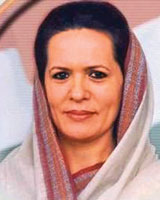
Sonia Gandhi |
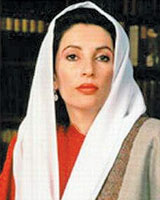
Benazir Bhutto |
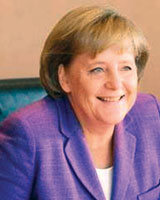
Angela Merkel |
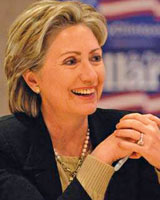
Hillary Clinton |
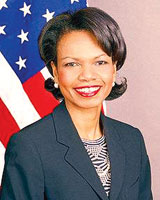
Condoleezza Rice |
Dr Pasqual emphasised the fact that Sri Lanka is another specific
Asian country which produced very strong female political figures in
recent history. Sirimavo Bandaranaike, and Chandrika Bandaranaike
Kumaratunga are the foremost Sri Lankan female political figures who
achieved maximum popularity through their unique way. Sirimavo
Bandaranaike who once headed the Non Aligned Movement was a very strong
spokeswoman. Even though she entered politics as the widow of the late
Prime Minister S W R D Bandaranaike, she could build up her own self
image. Chandrika Bandaranike Kumaratunga also played a vital role in Sri
Lankan politics and had a very strong and solid personality.
Dr Pasqual mentioned that the idea that women are weak in
decision-making is a widely spread one which is accepted by a majority
of the people in the world. And specifically women are considered to be
weak in the Asian region. But it is quite interesting to note that when
it comes to politics, the South Asian women are quite talented in
politics.
“We need strong women leaders with hard and solid decisions who have
the capability and confidence to interact with international community
and to handle the male counterparts in a solid manner.”
“There are classic examples to prove the fact that women’s
representation in international politics has increased. Some of the
figures are Queen Elizabeth II, Margaret Thatcher, Condoleezza Rice,
Hillary Clinton, Sonia Gandhi, Benazir Bhutto, Eleanor Roosevelt and
Angela Merkel.
Most of these powerful female political figures had very good family
lives, though they were involved in a ‘male dominated’ career. Queen
Elizabeth II has four children and even today she leads a successful
family life. Most of these women have been able to maintain a balance
between both ‘careers’”, she noted.
Another important fact according to Dr Pasqual is most female leaders
in the world are very feminine. They always wear saris, skirts, frocks
and use their own feminine voice in politics.
Some female politics are very powerful and have gained international
recognition. For example when Mao Tse-Tung’s wife entered politics, her
male counterparts were uneasy about it and considered her as a threat to
them. Another case is, when Barack Obama was fighting for the presidency
in the USA, his main challenge was Hillary Clinton. Though she could not
win, it shows the power of women in politics.
“Though there are a number of examples to prove women’s power in
politics, still there are some regions and countries where women are
totally marginalised having only a very low representation in politics.
Some of the examples are, Afghanistan, Pakistan, Kuwait, UAE, Qatar,
Oman, Yemen, Laos etc.” “But when it comes to regions like USA, South
Africa, Nicaragua, Australia, Ireland etc, female representation in
politics is really good. But still 50 percent has not been reached in
any country.
And I personally believe that it is hard to achieve it since men are
very strongly established in the field and it is not fair to force
people to vote for their leaders in a gender based system. It will
produce negative outcomes. However I strongly believe that women must be
more forward, educated and should achieve their rights in politics
through their own way without waiting till men give it to them. Women
have talents, capabilities and are capable of achieving what they want.”
Pasqual stated.
Beauty and the feminists
Aditha DISSANAYAKE
Man has extolled the beauty of women from the time he was able to
speak, sing and write. “As evening comes/the golden hued
beauties/...appear like/vatkol flowers/entangled with katrola flowers”
wrote the poet Agboy describing the Sigiri damsels on the mirror wall.
“Plucking a flower from my mate’s dress/I place it before the golden
hued beauty” said Kital, yet another visitor, who admired the beauty of
the women painted on the Sigiri rock.
|
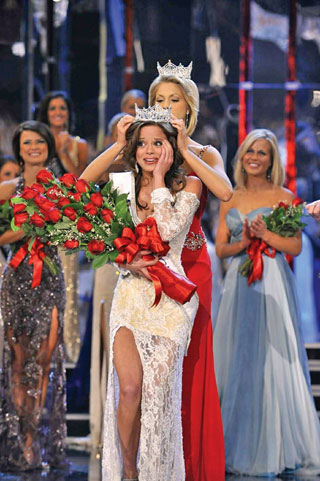
Who can judge beauty? Who can challenge? |
But, what exactly is beauty? Ask the philosophers. Plato, Immanuel
Kant, David Hume. According to Kant (if my interpretation of his theory
is right) judgments of beauty are based on feeling, and so, the accuracy
of these judgments cannot be proved. “Beauty is no quality in things
themselves” says Hume. “It exists merely in the mind which contemplates
them.”
Plato on the other hand, thinks it is only the Philosopher who has
special capacities and a particular sort of education who can get a
better glimpse of the Form of Beauty than the ordinary citizens.
According to his theory, if A is a certain woman and B is a certain
statue and both “A is beautiful” and “B is beautiful” are true
statements, one might be tempted to think of the woman and the statue as
participating in or sharing some common property, despite their being
otherwise quite different. Plato calls this common property ‘beauty
itself,’ as distinct from the particular beauty of either woman or
statue. What does this really mean? Cheer up. As Drew A. Hyland writes
in “Plato and the Question of Beauty”, Plato himself does not know what
exactly he is explaining and “ultimately gives up on the possibility of
a definition for beauty.”
In such a context, one wonders how a panel of judges can, every year,
select a certain individual from over eighty contestants and crown her
as the most beautiful woman in the universe.
Not surprisingly, beauty contests have never been a hit with strong
feminists. According to an article in the Time magazine, describing the
history of the Miss America pageant, in 1968, 400 women showed up to
protest the pageant held in Atlantic City, N.J. A mock crown was placed
on the head of a sheep amidst chants of “Ain’t she sweet, makin’ profit
off her meat.” Since then, on two other occasions the protests over
beauty pageants snowballed into avalanches. There were demonstrations
against Miss World by feminists and Hindu nationalists when it was held
in Bangalore in 1996. Riots in Kaduna in northern Nigeria over Miss
World 2002 led to the contest being moved to London.
The main argument against beauty contests is that they promote an
ideal of female beauty to which only a minority of women can
realistically aspire.
Moreover, according to feminist critiques of beauty, beauty contests
fail to challenge the harmful political attitudes of society towards
women. The contestants in a beauty contest are judged on their physical
appearance rather than on any other qualities they may possess (the
existence of a ‘talent’ element in these contests is all very well, but
ugly women will simply never win, no matter how heavily talented they
are). Judging women, but not men, primarily on their looks contributes
to the subjugation of women because other qualities, such as
intelligence, are not seen as part of ideal femininity and therefore not
as things to which women should aspire.
Thus, despite paying lip-service to feminist keywords such as
empowerment and self-confidence, beauty contests do nothing concrete to
aid the liberation of women. By reinforcing looks as the most important
feminine quality, they are seen as harmful to women’s liberation in
general.
Yet, there is, as always, the other side of the coin. Those who see
nothing wrong in beauty contests argue that a beauty contest too is
merely a competition. Every competition, of every kind, values certain
qualities over others - being able to lift heavy weights cannot be seen
as the best definition of humanity, yet, prizes are given for
weightlifting; similarly, giving a prize to a beautiful woman for her
beauty, does not mean beauty is all that matters when it comes to women
in the whole wide universe.
Beauty contests, like sports, can also be seen as an important focus
of national or regional pride. The victories in recent years of Miss
India, Miss Turkey and Miss Nigeria in Miss World competitions made many
Indians, Turks and Nigerians proud and were seen as symbolic of those
countries’ progress in competing with more powerful countries on their
own terms.
Good or bad, even as some feminists argue that beauty contests turn a
woman into a dupe of fashion and thus a collaborator in her own
oppression, there are also other feminists who feel feminism needs to
end its long obsession with the politics of personal appearance, and get
past its dim view of beauty as well as beauty contests.
“Voices from around the world report a variety of conditions and
systems under which only one thing holds constant - the universal
second-class status of females. We should not waste time quibbling over
what to wear to the conflict” says author Linda Scott, a feminist who
thinks the anti-beauty issue has divided women much more than it has
aided their cause. Finally, here is Miss Venezuela, who was crowned Miss
Universe 2008 answering a question on sexual discrimination in the work
place. “I believe that nowadays we women have overcome many obstacles,
and I do believe that we have reached the same level that men have. We
must realize there are no longer any barriers amongst us.”
The audience goes wild and applauds as if she has made the statement
of the century. If you agree, clap along.
If you do not, all you have to do is simply change the channel. As
Plato said leave Beauty to the philosophers.
[email protected]
|



